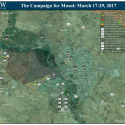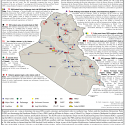The Campaign for Mosul: March 17-29, 2017
Mar 29, 2017 - Emily Anagnostos
The Iraqi Security Forces (ISF) slowed its advance into western Mosul on March 26 in order to regroup and prepare for an assault on the Old City, the densest part of western Mosul in terms of both population and infrastructure. The U.S. is deploying an additional 240 soldiers to Mosul, likely to support a final push through the Old City. The ISF has also slowed its operation out of continued concerns of civilian casualties throughout the western Mosul operation. Humanitarian concerns flared when local sources claimed that a Coalition airstrike on March 17 killed as many as 200 civilians. Meanwhile, Iran is deepening the role of its proxy Badr Organization in Ninewa Province to influence the post-ISIS security and political structure in the province.







